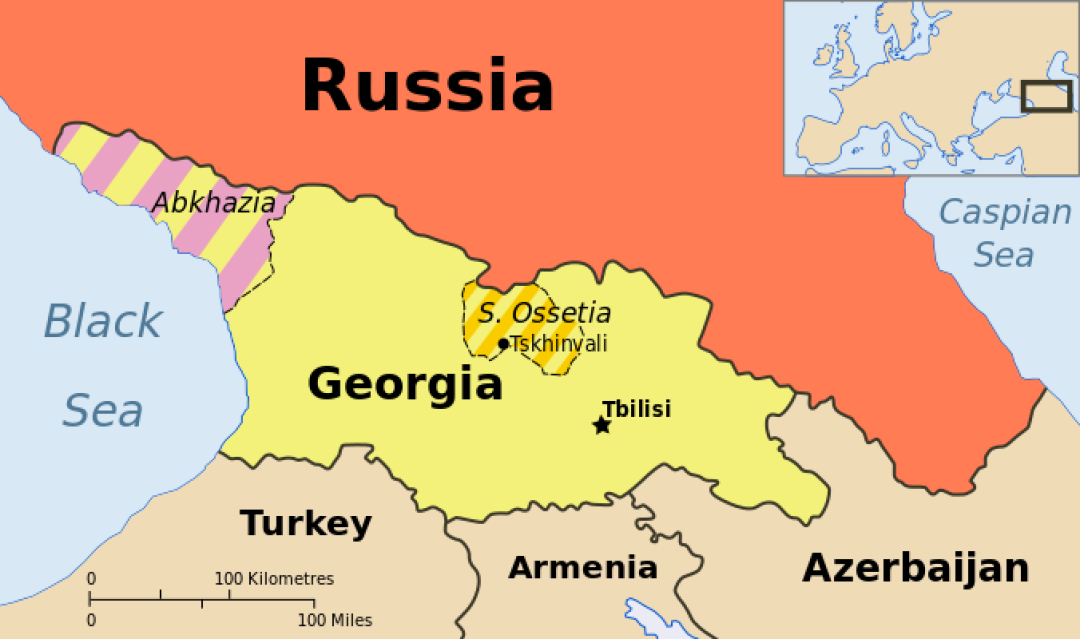
Occupied Abkhazia in Crisis

Despite resistance to Russian pressure to adopt the investment plan, Moscow appears to have gained the upper hand through a mixture of pressure and diplomacy. The new de facto rulers of occupied Abkhazia are now less hostile to the prospects of a major agreement with Russia.
Over the past few months, the occupied Georgian region of Abkhazia has experienced a political and energy crisis. As the geopolitical situation in the South Caucasus shifts, the separatist region's position has become increasingly vulnerable.
Since the beginning of November, the occupied region of Abkhazia has been facing severe electricity restrictions due to an energy deficit. This is due to low water levels in the Enguri hydroelectric dam, which lies between Abkhazia and the rest of Georgia. Normally, the deficit, which could not be fully met by electricity from the Enguri dam, was covered by electricity flows from Russia. At the moment, electricity prices in Abkhazia are only covered for the month of December, and the region has no other sources of electricity, which means that from January 2025 a new arrangement with Russia will have to be found. Lately, Moscow has been selling electricity to Abkhazia at market prices, which has only made life more difficult for ordinary Abkhazians.
Another reason for the electricity shortages are the restrictions imposed by Russia. At the moment, the most Abkhazia can afford is to pay for electricity from Russia at night, which costs 8-10 million rubles a night. Since "Chernomorenergo", the company responsible for electricity in occupied Abkhazia, cannot pay for daytime electricity, which costs about 30 million rubles, the result is that electricity is on in occupied Abkhazia for only about three hours during the day.
There are also much more fundamental problems. The electricity crisis in Abkhazia has deeper roots, such as the widespread illegal mining of cryptocurrencies. According to Abkhazian media, illegal mining operations consume about 1 million kWh of electricity per day. Abkhazia's annual electricity deficit is 700-750 million kWh. The Inguri hydropower plant produces 1.8 million kWh per year, while direct losses from cryptocurrency mining amount to 1.6 million kWh. Thus, even in an ideal situation, Abkhazia's own electricity production is almost entirely consumed by illegal cryptocurrency 'farms'.
The Abkhazians tried to shut down the internet at night to stop the mining, but this caused discontent among internet providers, as their losses would be very significant. In addition, the absence of the internet would bring petrol stations, ATMs, shops and hotels to a standstill, wherever cards are accepted. There have also been attempts to close schools and kindergartens because there are not enough generators for everyone in Abkhazia. As a result, decisions have been made at district and municipal level to keep the education sector running as long as the weather remains warm. In addition, Abkhazia does not receive fuel from Russia (which is needed for generators) and the region has no fuel reserves.
The possibility of restoring friendly relations between Russia and separatist Abkhazia remains. According to the Russian leadership, both the investment agreement and Russia's social assistance are still being discussed with Abkhazian partners. However, the new leadership in Abkhazia clearly does not want to return to the controversial agreements with Russia. The fact that the Abkhazian leadership has turned to Moscow means that Sukhumi still believes it is possible to maintain close relations without any reciprocity from Abkhazia. How realistic this approach is remains debatable, given the enormous disparity in power between the separatist region and its patron.
Indeed, in the longer term it is likely that the so-called interim government will lose the support of even those Abkhazians who, for various reasons, supported the removal of former leader Aslan Bzhania and rejected the investment agreement with Russia. The matter is reaching the point where the current crisis can only be resolved if the Abkhazian side fully accommodates Russia's demands on critical issues.
Russia has cleverly used a variety of tools at its disposal to its own advantage. Moscow is less interested in wider geopolitical calculations involving Tbilisi or the collective West. Russia's approach to Abkhazia depends entirely on the separatist region's willingness to adopt laws that would facilitate Moscow's position in this part of the South Caucasus. If the new leadership of the separatist region postpones the discussion of the investment agreement, Russia will use other means to put pressure on the region.
Emil Avdaliani is a professor of international relations at the European University in Tbilisi, Georgia, and a scholar of the Silk Roads. He can be reached on Twitter/X at @emilavdaliani.
See Also


From Neorealism to Neoliberalism: Armenia’s Strategic Pivot in Foreign Policy After the Nagorno-Karabakh Conflict

Georgia and Russia: New Turn in Bilateral Relations

3+3 Initiative as a New Order in the South Caucasus

Economic Cooperation Between Armenia and Georgia: Potential and Challenges Ahead

